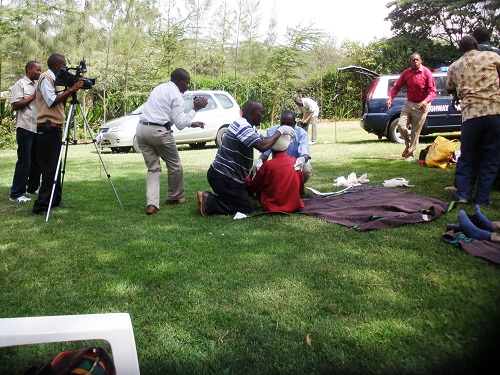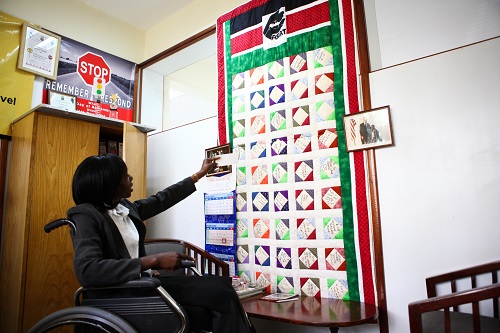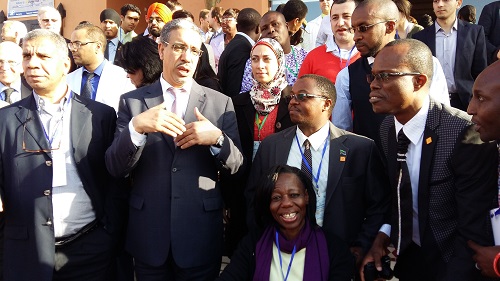
First responder Courses for matatu drivers and traffic police
The objective of the course is :
In many incidents the PSV drivers are the first on the scene of many road crashes on major highways across the country. This makes them a possible first resource when it comes to response and assistance to the victims. Many road traffic victims have suffered permanent disability in the hands of untrained responders. To reduce these unfortunate cases of victims being mishandled there is need to train majority of the road users especially the PSV operators and the police who end up dealing with over 70% of cases.
The Association for Safe International Road Travel (ASIRT Kenya) in collaboration with the Emergency Nurses Association of Kenya (ENAK) and other partners conduct these courses with logistical support from Matatu operators and the traffic police who recommend the trainees.

First responder training for traffic police and PSV drivers
Results include:
School safety program
A growing epidemic of road traffic crashes is devastating the next generation of children around the world. Every 30 seconds a person is killed in a road crash. More than 3300 per day and over 1.2 million people per year die in road crashes worldwide. As many as 50 million are injured. Vulnerable road users particularly at risk, are children. 500 children die every day in road crashes. In many Asian, African, and Middle Eastern countries between 40 and 50 per cent of people killed as a result of a road crash are pedestrians.
In Kenya adults and children are killed every day as a result of road crashes, and tens of thousands are injured, often suffering lifelong disability.
According to the 'Road Safety Status Report 2015' launched by the National Transport and Safety Authority (NTSA), on 14th January, 2016, a total of 3,057 people lost their lives in road crashes.
Children are vulnerable road users. Anywhere where there is a potential for moving vehicles is a potentially dangerous traffic situation for children. This is because children:
ASIRT Kenya's interventions towards child safety include:
ASIRT Kenya partners with various schools that are near roads and have a record of children being involved in road crashes. The programs involve training of teachers, parents and students.
Kasarani primary School
The children and staff were trained on safe use of roads and given reflective sashes to promote their visibility on roads
2. Promote localized road engineering to keep children safe on their school journey.
This involves mapping out areas near schools and on the school route that are crash prone and have recorded high numbers of crash incidents. These areas require signage and road calming measures like speed bumps and rumble strips. ASIRT Kenya advocates and engages the relevant authorities to push for modification of the environment. This is done by partnering with relevant authorities in the country
Kasarani primary school
With partnership with City Council, a zebra crossing was put on the road at the entrance of the school to facilitate the safe crossing of roads.
3. Encourage and assist parents in forming street crossing patrols for their children.
Through partnering with schools and having access to PTAs, parents are advised to teach their children about road safety. This is sensitization during parents meetings and other interactive school activities. .
With partnership with Usalama Watch Initiative, a person was stationed at the road with a stop and go sign (lollipop) to stop traffic and allow children to cross the road safely.
4. Help communities get organized as a key part of creating the long-term cultural changes that will keep children safer on the roads.
Through sensitizing of people in the community. Plays and skits are carried out during weekends and school holidays that emphasize road safety in a fun way that will engage the children and general public in the accident prone areas.
5. Use of reflective material to promote visibility
Upon completion of the sensitization program, we then issue reflective materials to the children to aid in making them visible when on the roads. These have included sashes, bags and bracelets.
ASIRT-Kenya gives family members and friends of road crash victims and survivors a chance to write messages on quilt pieces. These pieces are then joined to make quilt banners. These have been powerful tools that show the human impact of road crashes with each piece representing a life lost. They represent faces behind the numbers.

A display of the quilt at ASIRT Kenya office
ROAD SAFETY WEEKS
ASIRT Kenya spearheads and participates in observing Road Safety Weeks. This helps to focus the attention of all road users to matters related to road safety. The purpose is also to highlight the fact that road safety is a shared responsibility. ASIRT-Kenya collaborates with other stakeholders including the government. Key objectives include :
Activities include and not limited to:
International Awareness Events-
ASIRT Kenya has spearheaded World day of Remembrance for Road crash victims in Kenya since year 2007. This is a day that is set aside by the United Nations and is commemorated every 3rd Sunday of November to acknowledge the impact of road crashes and to show solidarity with those affected by road crashes.
MEDIA ENGAGEMENT
RESEARCH:
ASIRT-Kenya were administrators for Georgetown University who designed an intervention to empower matatu passengers to voice their concerns to the drivers about bad driving. This research project commenced in March 2008 with thousands of vehicles enrolled. Preliminary data in the 1st phase shows a significant reduction (25-50%) in insurance claims. Following promising results of Heckle and Chide (phase 1), a randomized control trial of a road safety intervention in the matatu (mini-bus) sector in Kenya. The project has since expanded with Georgetown University working with other partners. For more information visit http://gui2de.georgetown.edu/projects/zusha/and http://www.georgetown.edu/news/usaid-grant-road-safety-zusha-project.html.
VICTIM SUPPORT
Counseling: ASIRT Kenya works with road crash survivors and their families to help them process the sudden loss through counseling and friendship. People who become suddenly disabled by road crashes often find it difficult to adjust and be reintegrated to society after hospitalization.
ASIRT Kenya also empowers crash survivors and their families to be advocates for road safety. Several opportunities through testimonials in public events like World day of remembrance for road crash victims and also working through media.
GLOBAL ROAD SAFETY
In 2010, a consortium of partners received funding from The Bloomberg Family Foundation to expand road safety to 10 low- or middle-income countries. Dubbed the Road Safety in 10 Countries Project (or RS10 ), this initiative included a road traffic injury prevention component in all 10 countries: Brazil, Cambodia, China, Egypt, India, Kenya, Mexico, Russian Federation, Turkey and Vietnam. Additionally. The initiative also focused on trauma care in Kenya and India, and data system development in Kenya and Egypt. RS10 was implemented over five years.
Interventions focused on two major risk factors agreed upon by local stakeholders.
The project was undertaken through a consortium approach. The consortium partners are:
The Kenya project had three components:
ASIRT-Kenya was a member of the national coordinating committee charged bith the role role:
OTHER GLOBAL ACTIVITIES
ASIRT Kenya has participated in various international events. These include participatation at the first UN Youth Assembly in Geneva, Switzerland in 2007, "Make roads safe" Africa meeting in Cape Town, the "Make Roads Safe" Sub Saharan African Automobile conference in Kampala in 2008 , Global meetings for NGOs Advocating for Road Safety in Brussels in 2009, Washington DC, Turkey and Morocco.

Minister for transportation and members from NGOs from across the globe.
Are children the most vulnerable road users? Road traffic injuries are the 2nd leading for ages 5-14yr old and leading cause of death between age 15-19 yrs globally (WHO). In recognition of this, the UN has declared the third global road safety week starting on 4th-10th May 2015. This will focus on children and road safety http://www.who.int/roadsafety/week/2015/en/
ASIRT Kenya‘s “Be Seen Be Safe” project’s main objective is to increase visibility of school going children by giving them reflective sashes. This is complimented by efforts by other organizations by providing a zebra crossing and crossing guards for youngsters to be able to cross with less crash risks. This intervention has given pupils more time to be at school and to concentrate on their studies rather than being at home nursing injuries.
We can all make a difference. Support ASIRT-Kenya and help us save the lives of our children. Please send your donation to ASIRT KENYA CFC Prime Bank A/C number 2000087191 or contact us at: This email address is being protected from spambots. You need JavaScript enabled to view it.